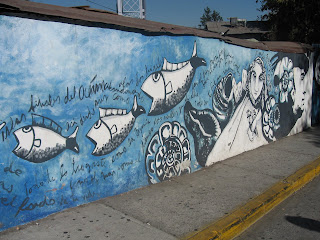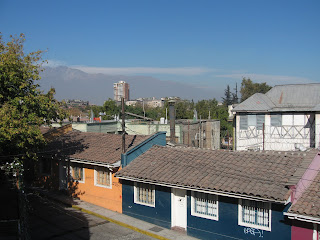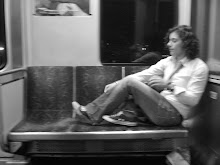Quédate en el camino.
Ha llegado la noche para ti.
Tal vez de madrugada nos veremos de nuevo.
- Pablo Neruda "El Olvido"
I recently went to one of Pablo Neruda's three houses here in Chile. This one is located in Barrio Bellavista (the "hip, cultural" place to be) and it is hidden in the backdrop of the action right up against the hill. If you didn't know it was Pablo Neruda's previous house, you'd probably pass it by and think it was simply another well-designed house on the hill with colors exploding around it to keep it in line with the rest of the area.
When we went in, there was this presence that seemed to loom over each room and an odd calm that has been hard to find within these city limits. Each of his three houses are built to make you feel like you're actually in a boat, and he achieved that feeling almost to perfection. The history of his life and the stories that we heard were pretty amazing, and you could see how much of that reflected itself in his poetry. I wish I could bring to life the feeling of walking through his house but it is fairly indescribable, and with my newly present lack of English, I fear I may simply butcher any sort of description I try to muster up. I hope some pictures below can speak a little bit for me:



I find that I am stuck between two different languages, and thus two different worlds. I have not yet mastered the Spanish language, but I am quickly losing my ability to think, write, and even speak in my mother tongue. I recently asked a few of my "gringo" friends if they were going through the same thing and they admitted much frustration in this aspect. It's been a really eye opening experience and a really confusing one at the same time. I know I have mentioned this before, but its becoming more and more present as time goes on. I find I sit in front of my blog quite often and quit before making it to the end of a blog due to the frustration of not expressing myself in the way I'd like, or the new fights I get in with 'spell-check'. I also notice that I tend to write like a 4-year-old girl with run-on sentences, rambling thoughts, and incorrect words (ie: their, there, they're...). It drives me crazy to the point of avoiding my blog, or just accepting the fact that I now sound like a fool in two languages. I find that speaking 4-year-old English all day with my students doesn't help my case, and it leads me to many of the above mentioned mistakes. I suppose more than anything, you are all now sufficiently warned and will not cringe when you stumble upon one of those run-ons, spelling mistakes, or incoherent thoughts. Either way, it's been a very interesting transition.
The city has been greeted with a layer of smog, and overnight the blanket of dirt was laid over the mountains. I have never in my life seen so much filth in the air, and the beautiful view we once had of the mountain range is now covered by a hazy mess. With the smog came the autumn, and I must say my prediction has been correct: no autumn will ever hold a flame to the autumns in New England. As I was reflecting on (more like missing) the fall in New England, I realized how much that is part of OUR culture. The bright leaves go hand-in-hand with apple cider or carved pumpkins. The cold air is our clue to put on more layers and start baking something yummy. The gloves get slipped on and hair becomes messy under warm hats and hoods. There is simply nothing like a New England autumn. I always keep my eye out for leaves bursting into shades of orange and red, but I am often disappointed to realize (time and again) that I will not be lucky enough to find one here.
My mind has already started to retire in English, so I might have to cut it there until I can re-boot and make sense of myself. This weekend, I am going to the mountains outside the city to breathe some fresh air and go camping. I'll still be keeping my eye out for leaves changing colors (out of habit) though I know it'll be a miracle to see one.
I'll keep you updated on what I find.
I miss you all and hope you're doing well. I think about everyone back home and what adventures they may be up to. Keep in touch.
Que todo este bien y espero que ustedes sigan sonriendo.
Keep the hugs flowing.
Send some through the smog.
Much much love.
I recently came across this article online about the Chilean culture and the "10 things you really wish you'd known about Chile" before arriving. I'm sure this article can sum up the idea of Chile better than I ever could, and it's rather amusing as well. Enjoy:
'Cachai,' Completos and Cafés con Piernas: 10 Things We Really Wish We'd Known About Chile
Your first Sunday in Santiago likely left you wandering a ghost town with a non-functional cell phone ("international" plan--yeah, right), trying not to stare at the overly affectionate Chilean couples around every corner and wondering why everyone kept saying "cachai."
But you're not alone--many of us have been there, too, and hope you won't make the same mistakes we once did. Here's a crash course on the 10 most beneficial, useful and even crucial things to know about Chilean life that we each learned the hard way:
1. Chileans tend to really push the envelope when it comes to showing the world just how much they love their other half.
A simple peck on the cheek and pat of the hand just won't do for this impassioned nation. Regardless of age, expect to see various un-edifying examples of Latin lovin' in public spaces across the country.
2. The cornerstone of Chilean culture is the country's fundamental slang that makes "proper" Spanish speakers cringe.
Practically every chilenismo (Chilean saying) has at least two meanings, many times contrary to each other. La raja often means great, spectacular--or simply, the s**t. On the other hand, it can also mean very tired or spent.
Worse yet, the word weón--and its infinite derivatives--is used more often than a drunken Irishman swears. It can mean nearly anything from a term of endearment for a close friend to a violent word directed at enemies, to an idiot, "dude," "f**k" and practically any other noun, verb or adjective possible in conversation. Cachai ("got it")?
3. Santiago on Sunday feels like the Twilight Zone.
No one is around and the few shopkeepers who are working peer at you strangely as if they're wondering, "Why are you here? Is there something wrong with you?" From Las Condes to Lampa, the streets are as dead as the dodo. It’s like everyone knows something you don't, and is out somewhere having fun without you.
4. If you like hot dogs, Chile is mecca.
Completos (hot dogs with tomato salsa and mayonnaise) and italianos (hot dogs with tomato salsa, mayonnaise and guacamole) are served everywhere and eaten on almost any occasion.
Their pile of ingredients can be a bit intimidating at first; but once you polish your technique, you'll find that they're a surprisingly satisfying and tasty part of Chilean life.
5. Santiago’s urban narcotic jungle can be summed up in two words: Avenida Suecia.
While the swarm of drug movement is abound on this Providencia street, you'll also find lots of strip bars and cheap, friendly, but dubious suripantas (hookers). Watch out for pickpocketers, flaites and possible she-males, though.
6. Chilean phones aren't like phones anywhere else.
It's perfectly obvious to all the locals that you dial "02" before the number if it's a land line, "09" if it's a mobile and "963" if the recipient has brown hair and it's a Tuesday, but for any newcomer the process is utterly incomprehensible.
To make matters worse, if you've only got 3 pesos of credit left on your phone, you may as well send smoke signals--and you didn't really expect to be able to send and receive texts from abroad with your new mobile, did you?
7. Pisco is the pride of Chilean booze, and a pisco sour is the way to imbibe this deceptively strong grape liquor.
However, finding a good pisco sour can be hit or miss. When contemplating a sample, make sure that the bar makes them fresh, either normal (lemon juice, sugar, pisco, and ice) or peruano (lime juice, sugar, pisco, ice, and egg white).
Look around for the traditional petite flute glass in the hands of locals--it's a bad sign if everyone is drinking beer by the liter.
8. If it's your first time in Chile, prepare to fork over some cash at the airport (or swipe your credit card) when you arrive.
There is a "reciprocity fee" charged to US (US$131), Canadian (US$132), Mexican (US$15) and Australian (US$61) citizens upon entry to Chile. The stamp you're awarded is valid for the life of your passport, but the tourist visa lasts for just 90 days. Avoid major hassles and don't let your tourist visa expire on you--immigration won't let you leave without resolving the issue. (Trust us, we've been down that road.)
9. Whether you're job hunting, booking accomodations or just asking for a tad more info on a concert or event, forget about sending an email.
It takes a while to realize it wasn't just bad luck that no one answered--Chilean culture values the warmth of face-to-face communication or phone calls over the cold, impersonal binaries of an email or text.
To further frustrate any first-worlder, Chilean time is different than the hour on your watch. It's an unspoken understanding that whenever you work out a good time for both parties, you actually mean any time at least 30 or 40 minutes thereafter--stretching up to 4 or 5 hours when talking to gardeners, plumbers or cable TV repairmen.
10. Many cafés in Chile serve more than just coffee.
A café con piernas ("coffee with legs") comes with, well, a nice side of T and A. As one of Chile's most tantalizing cultural phenomena, delicious espressos and juices in these themed cafés are served by affectionate, attentive and scantily clad waitresses.
That's just a little idea of Chile. Hope you enjoyed.
MISS YOU ALL



